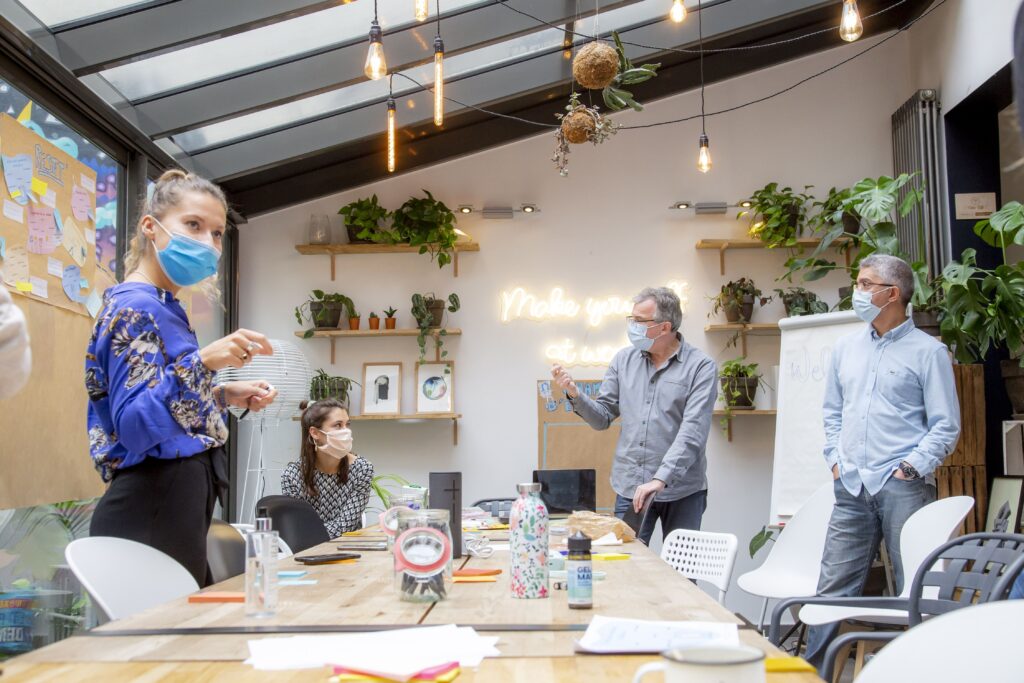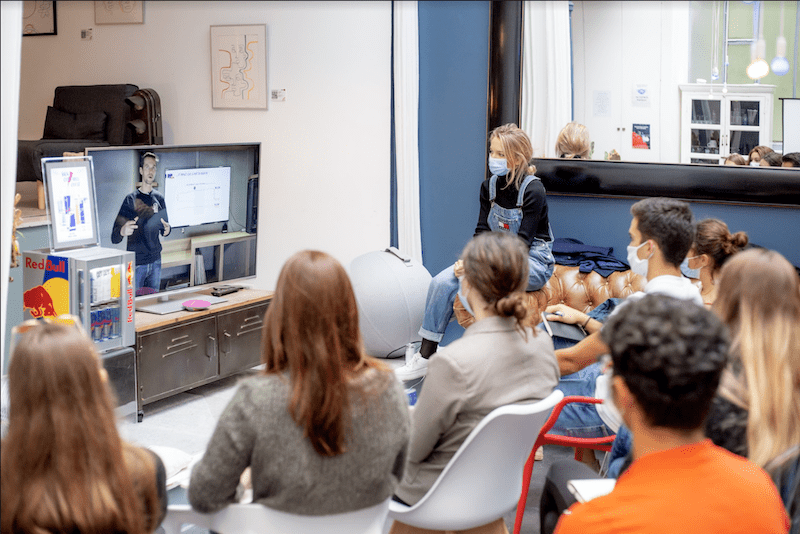The 2020 crisis has led many companies to reconsider their office spaces. Whether working from home, working at the office, or resorting to third places, it seems that everyone will inevitably have to find some sort of compromise. What’s the goal? To achieve more efficient ways of organizing work (and working from home) that guarantee productivity, well-being, and, ultimately, optimize the return on investment inherent in the workplace. But then what? How will office spaces be reinvented in 2021? OfficeRiders takes a look back at 2020 and discusses some of the major trends in the market for office space real estate.
In 2020 at OfficeRiders, there’s been a widespread awareness among our customers about the challenges of working from home. Nevertheless, business activity has been primarily influenced by changes in the nature of recorded demand. In terms of supply, our hosts have sought to optimize floor space and diversify their sources of revenue.
Demand for flexible, safe and “phygital” locations
Regardless of lockdown, we had more requests this year, but with smaller baskets and staff numbers. Overall, the average number of Riders per booking has dropped from 21 to 13.
In fact, during business months, we’ve seen a sharp increase in booking levels compared to 2019, with a growth rate of +140% for the months of June and September, for example.
The events category, as well as additional associated services (catering, other activities), were significantly scaled back by the Riders. On the other hand, 2020 saw an increase in volumes in co-working, meetings, and production categories over the months of operation. Our Riders have placed particular emphasis on flexibility and price, but also on food safety and the ability to accommodate “phygital” formats. As of May 2020, 92% of companies have opted for safe locations. Our Riders prioritize areas that respect strict protocols, labelled “Anti-Covid”.

The “Fiber Optic” search filter was used about 8 times more than in 2019. Workspaces with fast and stable internet connections are conducive to video collaboration, platforms, and streaming applications. Customers have preferred these spaces, as well as services that allow combining “face-to-face” and digital services via hybrid formats. Certain criteria have been particularly motivating for the Riders when using the website during the health crisis.
For 76% of customers: the possibility of finding spacious locations that are close to residential areas or transportation hubs. The goal? Limiting travel to avoid contact while increasing productivity.
Film production companies, authorized during the lockdown period, were able to take advantage of the many unique and diverse spaces on site. They sought out natural settings at unbeatable prices for their filming and shooting sessions.
“Third places” – at the heart of regular, or even “almost daily” use
Client companies seem to be looking less and less for spaces available on a daily basis and are instead looking exclusively for locations for exceptional occasions, such as Comex, for example. We’re seeing an increasingly recurring demand for these sorts of spaces, which has become regular, or even almost daily in some cases.
The overall recurrence rate in 2020 is 42%, compared to 34% in 2019.
Before the crisis, the combination of working at home, in third places, and at the office seemed to be a strategic choice for some companies. This mainly concerned those whose work methods were perceived as “innovative”: start-ups, scale-ups and SMEs. Since then, the indicators observed, as well as the discussions conducted with our customers, show that this approach will more broadly affect all types of companies. The widespread adoption of a hybrid policy would establish itself.
An increased willingness to optimize and make the most of available square meters
OfficeRiders’ business model has proven attractive in times of crisis and declining purchasing power. This year, we’ve noticed an increased willingness on the part of guests to diversify the means of making their properties profitable.

As the tourism industry ground to a halt, guests and professionals in various sectors looked for new ways to diversify and secure their property revenues and short-term income. OfficeRiders recorded a 176% increase in the amount of space reported in 2020, compared to 2019. With the fall of tourism and the spread of working at home, daily office use is no longer considered by private individuals as a simple salary supplement. It’s now a real source of income diversification. Short-term rental customers have also seen the considerable potential associated with the optimization of their under-utilized office space during the day.
There are also more than a dozen new rental property services in France and Europe that have joined OfficeRiders in 2020.
2020 marks the end of centralized, permanent offices
For a long time, the property model has been thought of as “vertical,” with a focus on a company’s headquarters or office. This model is bound to change in the long term. We’ve already seen this with the emergence of the “flexible office”, which makes it possible to reduce the surface area of existing offices and, in addition, brings about the development of tools to “mutualize” spaces. This year, sitting in an office chair has never seemed more expensive or more remote than it has in 2020. Offices’ usefulness and necessity are being “challenged,” especially in a context where the return on investment isn’t being met. 2020 saw the rise of working from home and the emergence of virtual workspaces. In the age of digitalization and ubiquitous technologies, many companies have realized that many tasks can be performed remotely. It doesn’t make sense anymore to spend two hours commuting every day to work just to be alone in front of your computer. Nevertheless, working from home isn’t everything; other “off-line” elements are missing.
Most surveys point to the lack of interaction and communication within companies

Workspaces dedicated to people: from “Place to Work” to “Place to Connect”
Say goodbye to dehumanized offices: employees are expressing the need to regain spontaneous face-to-face interaction. Physical meetings are and remain a motivation factor, a source of creativity, and a means of team building. Collaboration, exchange, and social interaction have to be able to develop in a physical environment.

It’s therefore necessary to reinvent innovative models of physical spaces. Places where the values of socialization, flexibility, proximity, community, and micro-mobility could be reinforced and prioritized. It seems that the market is inevitably moving towards a much more flexible, decentralized, heterogeneous, and open model. A model of shared spaces adapted to each type of purpose – third places available on demand and marketed as a service that can be adjusted according to companies’ needs:
- Types of people: individuals, teams, partners, clients,
- Localization,
- The duration of business hosted and its format: workshops, brainstorming sessions, team building, training, product launches, post, workshops, etc.
OfficeRiders helps to “horizontalize” physical structures and promotes “quality of work”
In 2020, more than ever before, we’re working to build a future where we can work less remotely, where we can work better, and where physical workspaces serve the human being above all else.
This can be achieved by offering diversified spaces and services that contribute to the key issues of motivation, social interaction and creativity. By relying on innovative spaces and services, we offer all companies support when it comes to new real-life, virtual, and hybrid ways of working. We encourage companies to adopt new behaviors. For example, as of 2020, we have been offering “credit vouchers” to be distributed to teams for team meetings or individual work assignments. Find flexible and humanized workspaces for your next business meetings, by entrusting us with your tasks, or by coming directly to OfficeRiders.
Documentation & sources: OfficeRiders, 2020, Survey of customers who have reserved spaces on OfficeRiders from mid-March to December 2020. Paris & Co, 2020, “Sustainable City on the Future of Office Spaces Survey”. Peerspace, 2020, “Why Flexibility Works in the Post-Covid World”. Opinion Way for Empreinte Humaine, 2020, Baromètre T4, “Computer graphics on the psychological state, psychological risks and burnout of French employees”.

